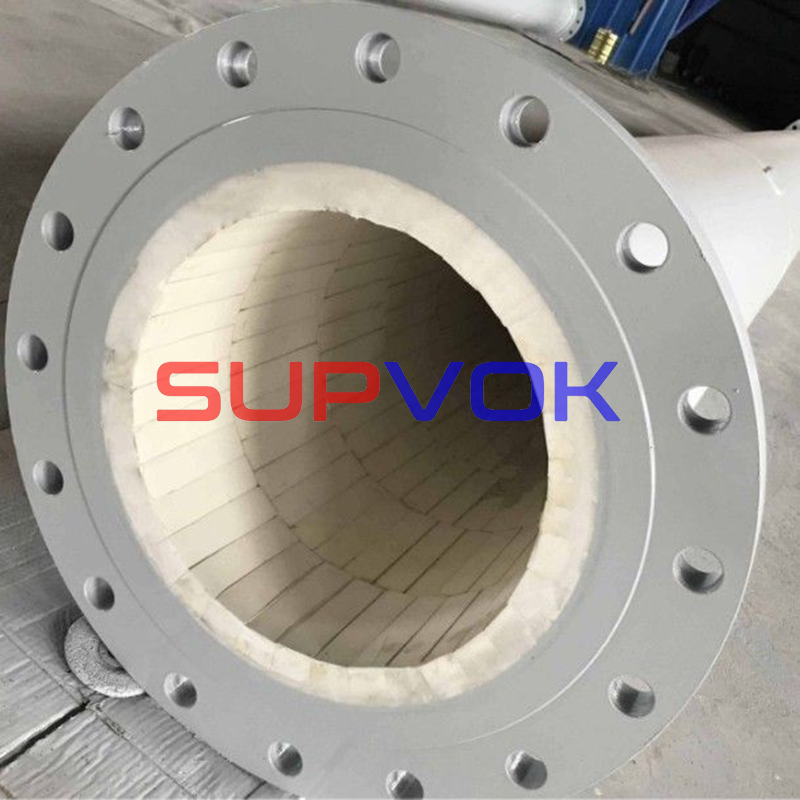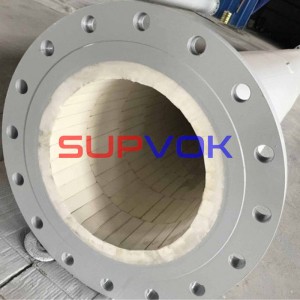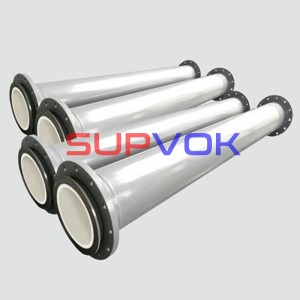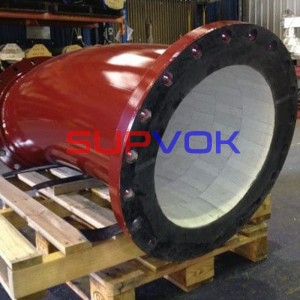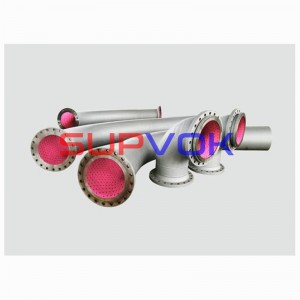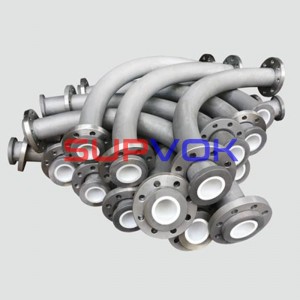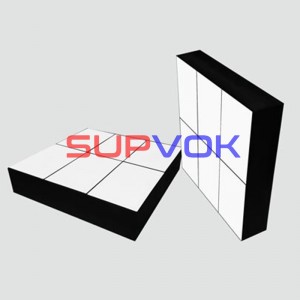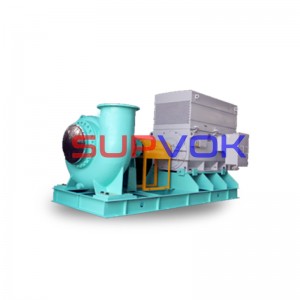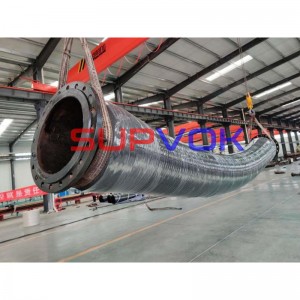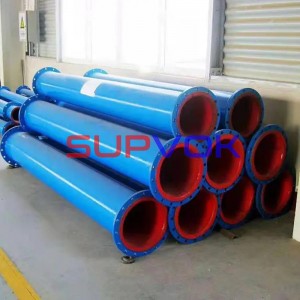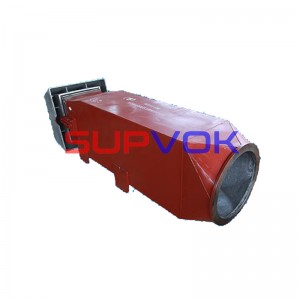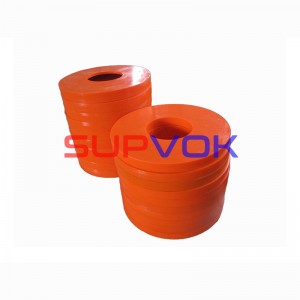Wear resistant Al2O3 ceramic lined pipe
Wear resistant Al2O3 ceramic lined pipe
Wear-resistant and corrosion-resistant ceramic pipes
Introduction to wear-resistant pipeline
The wear-resistant and corrosion-resistant equipment is thorny problem that has puzzled industrial enterprises for a long time, and directly affects the economic benefits of enterprises and the on-site working environment.
The traditional anti-wear technology mostly uses wear-resistant steel and other metal materials. With the development of new materials and transportation technology, the traditional anti-wear technology has been gradually replaced by a variety of new wear-resistant materials, such as special ceramics and so on.
Application range
The products are widely used in petroleum, steel, cement, thermal power, ports, coal, mining, smelting, chemical industry, engineering machinery, paper making, aluminum industry, building materials, powder engineering, grain machinery and other industries. Bulk material conveying system, pulverizing system and conveying system are exported to Southeast Asia, Europe, America, Australia, etc.
Common types of wear-resistant pipes
1 Centrifugal casting
Centrifugally cast composite ceramic pipe is a composite pipe produced by Self propagating high-temperature synthesis high speed centrifugation technology. It forms uniform, dense and smooth ceramic layer and transition layer at high temperature and high speed. Depending on the simple production technique and low cost, the products are suitable for long-distance powder transportation. However, their wear resistance is slightly worse than that of wear-resistant ceramic pipes, which are generally used as straight pipes.
2.Alumina ceramic wear-resistant pipe
Common types:
Pipes with alumina tile linings
The wear-resistant ceramic pipes with alumina tile linings is made of aluminum oxide ceramic tiles pasted on the internal wall of pipe with high temperature resistant strong viscos, which forms a firm wear-resistant layer after heating and curing. The production echnique is relatively simple. Meanwhile its production cycle is short and its cost is relatively low.
Technical specification
KSINOX has various types of wear-resistant pipes with alumina tiles. We can customize the alumina tiles for the wear-resist pipes. Such kind of pipes has no limitation on the sizes. In production, its diameter can be ranged from 1 inch to 120 inches, or even larger.
Pipes with spot welding ceramic tiles
Wear-resistant pipes with spot welding ceramic tiles is used to stick the alumina ceramic tiles with holes in the middle to inner wall of pipe with high temperature resistant strong adhesive. Meanwhile, the ceramic is firmly welded to the inner wall of the steel pipe through small holes with the spot welding technique.
In order to protect the welding spot, the ceramic cap will be adopted to screw on the top of product. Each ceramic tiles are mutually pressured and inserted. In addition, each ceramic tiles have the trapezoidal angle, which makes them closely connected without gaps. The product has relatively complitcated technique, long production cycle and high cost.
When the last piece of one circle is closely embedded, a 360 ° mechanical self-locking force is formed between the ceramic tiles. This technique has been used in Chinese bridge construction projects, since centuries ago.
Ceramic tubes in one-piece
The integrated molding technique is to fire the ceramic pipe fittings as a whole, cast them into the steel pipe with special filler, and then assemble them. The inner wall of the pipe is smooth. Such kind of products has good sealing performance and excellent wear-resistant and corrosion-resistant performance. However, such kind of products have long production cycle and high cost. They also have excellent corrosion resistant performance.
3. Ceramic lined composite steel pipe
The ceramic lined composite pipe make full use of advantages of steel pipes and corundum-based ceramics, which makes the pipe overcome the low hardness of steel pipe, poor wear-resistant performance and poor ceramic toughness.
Characteristics of steel pipes and corundum-based ceramics
Steel pipes: high strength, excellent toughness, excellent impact resistant performance, excellent welding performance
Corundum-based ceramics: high hardness, high wear-resistant performance, corrosion-resistant performance and excellent heat resistant performance
Thus, the composite pipe has good wear resistance, heat resistance, corrosion resistance, mechanical impact resistance, thermal impact resistance, good weldability and other comprehensive properties. It has been widely applied as ideal wear-resistant and corrosion-resistant pipeline for transporting granular materials, grinding and corrosive media.
Such kind of pipe has excellent wear-resistant performance, excellent corrosion-resistant performance and good heat resistant performance. It can be widely used as a grinding granular material and corrosive medium to transport sand, stone, pulverized coal, ash, aluminum liquid, etc., in power, metallurgy, mining, coal, chemical and other industries. Thus, the ceramic lined composite pipes should be an ideal anti-corrosion pipeline.
4. Ceramic rubber hose
Ceramic rubber hose is to embed the wear-resistant ceramic on the rubber pipe through the vulcanization technique. The pipe has excellent flexibility, wear-resistant performance and corrosion-resistant performance.
5.Other advanced ceramic wear-resistant pipes
Focusing on high temperature applications with special wear and corrosion, the ceramic pipe produced as a whole part can be considered. It is to fire the ceramic pipe fittings as a whole, cast them into the steel pipe with special filler, and then assemble them. The inner wall of the pipe is smooth. Such kind of products has good sealing performance and excellent wear-resistant and corrosion-resistant performance, as well as erosion resistant performance. In addition, such kind of products perfectly avoids the temperature limit of the adhesive and can operate under the high temperature environment of 1000 ℃. However, the advanced ceramic pipes produced as a whole part have long production cycle and high cost. Thus, the users need to make comprehensively consideration based on the practical situation. The products have superior wear-resistant performance and corrosion-resistant performance.
Pipe parameters
KSINO can supply the non-standard products which can be customized based on actual application parameters.



